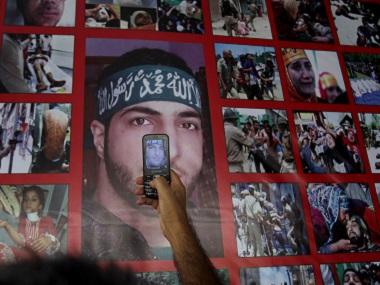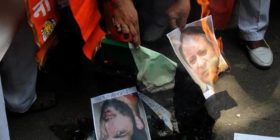The usual suspects, including Indian and western mainstream media, have been vociferous in alleging Indian human rights violation in Jammu and Kashmir in the wake of the killing of terrorist Burhan Wani and the subsequent rioting and stone-throwing. There were theatrical exaggerations on the use of pellet guns (without considering what would happen if real bullets were used instead). In general, they succeeded in embarrassing the Indian government.
But that may turn out to be a Pyrrhic victory for the separatists and their friends. Among other things, there was a PR disaster (from the ISPR point of view) created by Hafiz Saeed, founder of the banned terrorist outfit Jamaat-ud-Dawa, who expressed open admiration for the Indian National Congress and for Barkha Dutt, a journalist.
But more than that, the Indian government seems to have realised that being Mr Nice Guy is not earning it any medals, and that maybe it’s time to turn the plate around and try something slightly more robust. After all, samam and danam on a large scale have not worked with the Pakistanis (eg the Indus Water Treaty which is severely skewed in Pakistan’s favour) or Muslim Kashmiris (10 percent of all Government of India expenditure goes to Jammu and Kashmir and it has the lowest poverty rate in the country).
Time for some bhedam and the threat of a little dandam, perhaps. And where can this be? The most obvious friend that Pakistan has is China (and less obviously, the US). It’s best not to tangle with Washington, but Beijing is clearly New Delhi’s now and future enemy, so there should be spokes put into the Pakistan-China axis, by any means possible.
The Chinese are investing a great deal in their corridor through Pakistan-occupied Kashmir and Balochistan to Gwadar. And that is the most obvious target. India has maintained a hands-off approach despite the ongoing Baloch genocide since 1948. Balochistan accounts for almost half of Pakistan’s land area, and the Khan of Kalat was tricked and invaded by Pakistan, whereas his people had no particular wish to be part of it, according to Kanchan Gupta in The Daily Mail.
Attacked with helicopter gunships and heavy weapons, large numbers of Balochis have been getting killed ever since. This is a dirty little secret that Pakistan has kept quiet about. And unless they succeed in wiping out the Balochis, the Chinese dream of Gwadar dominating the Straits of Hormuz will not materialise. Since the Pakistanis will do anything the Chinese want, they will therefore complete a genocide of the Baloch. That is, unless India intervenes and supports the Baloch wholeheartedly.
The very first signs of Indian resolve on this issue came on 13 August when Prime Minister Narendra Modi minced no words in saying that “Pakistan forgets that it bombs its own citizens using fighter planes. The time has come when Pakistan shall have to answer to the world for the atrocities committed by it against people in Balochistan and PoK”.
The juxtaposition of Balochistan and PoK is a significant warning, suggesting that India will no longer stand by and watch the genocide unfold.
There have also been protests in PoK (and Gilgit-Baltistan) about the rough rule of the Punjabi army elites and the fact that the Chinese corridor through their land is not benefiting them. The data substantiates that they are worse off than Jammu and Kashmir in many, if not most respects, and have less power to remonstrate with the government, considering the administrative structures are unusual (not states). Modi’s statement that “PoK is ours” should give Pakistanis pause.
The third shoe to fall was the statement by the Ministry of External Affairs on 14 August in reaction to a sly Pakistani offer to send supplies to Jammu and Kashmir. MEA spokesperson Vikas Swarup tweeted the following:
Now, this is highly unusual. The Indian side usually errs on the side of being polite to a fault. But to bluntly and categorically state that Pakistan’s exports are “international terrorism, cross-border infiltrators, weapons, narcotics and fake currency” is the diplomatic equivalent of a slap on the face. The fact that India has done this, speaks volumes.
Typically, this sort of blunt, unpleasant talk is the forté of the Chinese. Apparently it takes very little to enrage the Chinese, and they get both their diplomats and their captive media such as Global Times to speak extremely rudely. A recent instance was the reaction to the South China Sea complaint being upheld by the Hague arbitrator.
The apparent fact that the honeymoon is over suggests a welcome rethinking by the foreign policy apparatus. There is nothing to be gained by treating Pakistan with kid gloves. Treat it with the contempt it deserves. In game theory, this is ‘tit for tat’, which India has never used before, and it, in fact, is the best strategy.
Seventy years late, but it is good if this is a new beginning on Independence Day.






Leave a reply